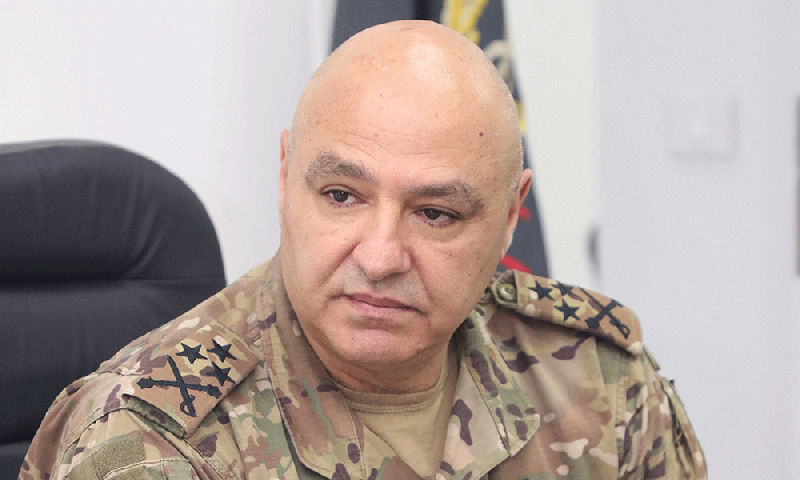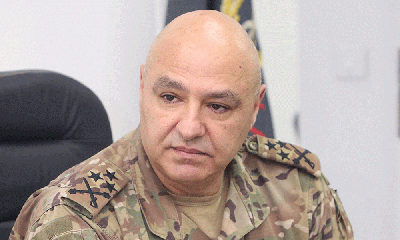The ongoing arrangements on the battlefield in Gaza are closely tied to the management of border clashes that Hezbollah is engaged in, utilizing Kornet missiles and drones to target Israeli military fortifications and positions, extending to its settlements. While the current confrontations are driven by war considerations within ongoing negotiations seeking a truce or ceasefire, as well as arrangements concerning the extraordinary Arab summit in Riyadh tomorrow, Saturday, and the subsequent Islamic Cooperation Conference, there is caution surrounding a phase where a ceasefire may not be feasible, or fears of an expansion in military operations arise, especially concerning the activation of the emergency plan or avoiding a vacuum in army leadership.
According to available information, there is a move to fill the leadership void through a technical extension of Army Commander General Joseph Aoun in a session held by the Cabinet, ahead of his retirement due next month. Starting Monday, the parliamentary delegation representing the Strong Republic Bloc will begin a tour of officials from Ain al-Tineh to explain the implications of the proposed extension for the rank of Major General to find a solution that spares the presidency from a vacuum.
The Council of Patriarchs stressed regarding the army leadership that “in this delicate security situation, and the ongoing war on our southern borders, it is imperative not to disturb the upper command of the army until a new president is elected. It is unacceptable to consider what has occurred in other institutions to prevent a void there. The matter is associated with the need to protect our people and ensure security across all Lebanese territories. Any change at the level of the army’s upper command requires wisdom and deliberation and should not be exploited for personal political gains.”
Political sources informed "Al-Liwaa" that after the hypothesis of war escalation diminished, based on recent statements by the Secretary-General of Hezbollah, the language of war has again overshadowed the fears of Lebanese people, indicating that the probabilities discussed by Sayyed Nasrallah will crystallize more and more, particularly as there is a significant expectation that his upcoming speech will differ from the previous one, although caution remains regarding the next steps.
Additionally, the same sources clarified that the Arab movement initiated by the urgent Arab summit might produce some attempt to reach a solution, although the developments on the battlefield do not suggest that this is imminent, with the timing of the ceasefire yet to be determined.
In terms of internal files, the sources talked about confusion regarding the budget concerning its issuance and critiques of its content, especially the tax section. Furthermore, political sources considered Hezbollah’s criticisms voiced by Sheikh Nabil Qaok, regarding the convening of the Arab summit tomorrow, Saturday, as reflecting the Iranian regime's stance, which sees the mentioned summit as an encirclement of Iran's efforts to leverage the Al-Aqsa Flood operation in its negotiations with the United States and the West concerning its problems and issues, and its influence in the Arab region at the expense of the Palestinian cause and the interests of the Palestinian people.
The convening of the Arab summit demonstrated an Arab inclination to take the initiative and present a unified Arab stance against the destructive war waged by Israel on the Gaza Strip and solidarity with the Palestinian people, politically and materially, emphasizing the urgent demand for a ceasefire and crafting a comprehensive Arab vision for the necessary steps to end this war, determining the situation in the sector afterward, and insisting on the two-state solution to resolve the ongoing conflict and grant Palestinians their rights through their state.
The sources predicted that Hezbollah Secretary-General Hassan Nasrallah will continue his campaign of criticism against the summit with his appearance tomorrow, Saturday, with expected escalation against it, which would further deteriorate relations between Lebanon and most of the countries participating in the summit and negatively impact efforts to improve these relations and overcome all causes of their deterioration and harm, specifically by the party over the past two decades.
The sources stated that it would have been wiser for the party to refrain from criticizing the summit's convening and to wait for its outcomes and decisions before targeting it, considering its impact on supporting and assisting the Palestinian people to end their ongoing suffering, as prior criticisms display premeditated Iranian intentions since holding such a summit removes important cards from the Iranian regime's hands that it sought to utilize for its interests.




